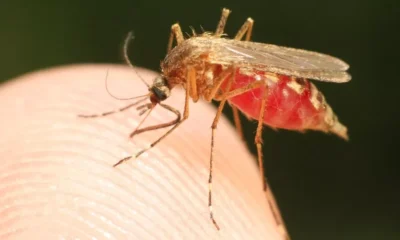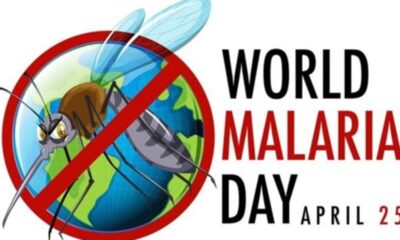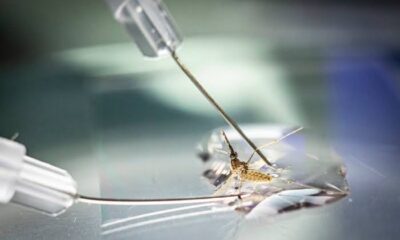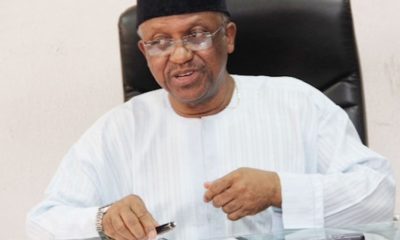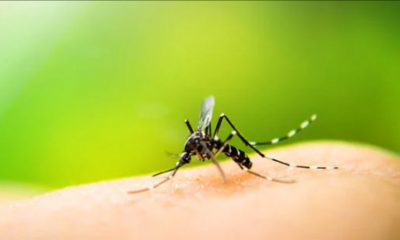Health
After The COVID-19 Vaccine, What About Malaria?
By Rachael Abuja, NAN
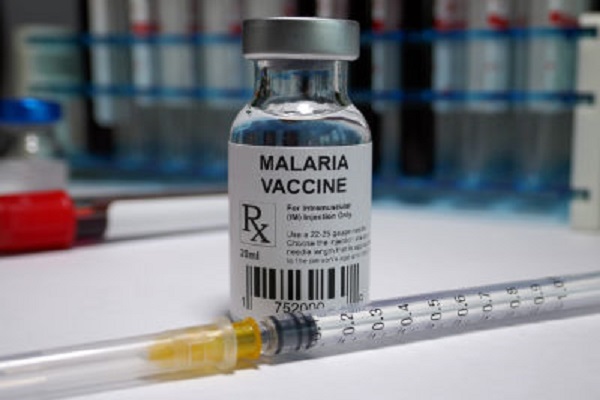
The coronavirus disease (COVID-19), currently ravaging the world was first reported in Wuhan, China, on Dec. 31 2019. But in less than one year, a vaccine was developed to tackle the pandemic.
The feat was possible because of international alliances. To cut the long story short, on June 24, 2020, China approved the CanSino vaccine for limited use in the military, on Aug. 11, 2020, Russia announced the approval of its Sputnik V vaccine for emergency use.
In December, 2020, WHO listed the Comirnaty COVID-19 mRNA vaccine for emergency use, making the Pfizer/BioNTech vaccine the first to receive emergency validation from WHO since the outbreak.
In Dec. 31, 2020, the UK became the first country in the world to approve this vaccine and began rolling out an initial 800,000 doses.
Unarguably, the speed in developing the COVID-19 vaccine was because of the global nature of the disease and the high mortality rate associated with it.
Meanwhile, no vaccine has been developed for a disease like malaria, an age-long disease wreaking havoc in the world, especially in Africa.
Malaria occupies a unique place in the annals of history. Over millennia, its victims have included Neolithic dwellers, early Chinese and Greeks, princes and paupers.
Though sufferers spread across sub-Saharan Africa, Asia, the Amazon basin, available records also showed that 40 per cent of the world’s population still live in areas where malaria is transmitted.
WHO also reaffirmed that diseases such as malaria are still the leading causes of deaths in tropical climates.
In 2019, more than 218 million cases and 409,000 deaths globally were attributed to malaria. 94 per cent occurred in Sub-Saharan Africa alone, mostly in young children.
According to the 2018 National Demographic Health Survey (NDHS), prepared by National Population Commission in collaboration with Federal Ministry of Health, Nigeria contributed 27 per cent (58.8 million cases) to the malaria burden. 23 per cent (88,320) to malaria deaths globally.
Around the world, there has been overwhelming focus on COVID-19 containment. Governments, philanthropists, private companies, organisations, industries and scientists are working tirelessly and allocating huge resources to tackle COVID-19 challenge.
Stakeholders have noted that the speed with which the COVID-19 vaccines were produced was a testament to the power of science, when researchers are provided the resources.
They opined that it was because malaria which has been with us for thousands of years and continues to cause major social and economic losses in the Sub-Saharan Africa, is not a global epidemic.
The African continent does not have a malaria vaccine and even a promising new vaccine developed by the same team of scientists that created the Oxford/AstraZeneca COVID-19 vaccine, is expected to be available by 2024.
Even without vaccine, China was recently declared malaria-free by WHO, after a 70-year effort of targeted action against the disease that reportedly affected 30 million Chinese residents in the 1940s.
It is the first country in the WHO Western Pacific region to receive the award in over three decades. Forty countries and territories globally have been granted malaria-free certification from WHO.
While malaria is preventable and treatable, experts say vaccine against the disease eluded scientists over the years because of the complexities of the parasite that cause malaria.
Some health experts in Nigeria stressed that the country has experts that could produce the vaccines.
They cited Prof. Augustine Njoku-Obi, a former President, Nigerian Academy of Sciences, who was said to have developed a vaccine against cholera, approved in 1971 by WHO.
They added that Njoku-Obi also developed a vaccine for malaria which had the potential of a major public health impact, but was not licensed because of inadequate funding and lack of political will.
Prof. Oyewale Tomori, the Chairman, BIOVACCINE Nigeria Limited (BVNL), however said that Njoku-Obi was more a microbiologist/bacteriologist and not a virologist, hence he worked on cholera and other bacterial agents,
“ Prof. Njoku-Obi was a distinguished bacteriologist/microbiologist, as distinct from being a virologist in the likes of professors Fabiyi and David-West.
“He was in 1977 elected as one of the Foundation Fellows of the Nigerian Academy of Science, and served as the President of the Academy between 1985 and 1986.
“The claim about the vaccine being endorsed by WHO is shrouded in national and international controversy; politically approved but scientifically no proof.’’
Tomori, a professor of virology and former Vice-Chancellor, Redeemer’s University, Ede, Osun, stressed that elimination of malaria was a viable goal for all countries.
He said that Nigeria must continue its commitment and investment in order to end malaria.
“China is the 40th country to be certified malaria-free. It took seven decades and resulted in the discovery of a new drug, artemisinin, that won its discoverer the Nobel Prize in 2015, and is now part of frontline therapies worldwide.
“Three countries in Africa – Mauritius-1973, Reunion- 1979, and Algeria-2019 have been certified by WHO as malaria-free, two others- Lesotho and Seychelles, never reported malaria at all.
“Europe had endemic malaria but got rid of it due to improved sanitary measures. The last European country to be certified malaria- free was Uzbekistan in 2018. I think these measures are more than the drug responsible for their malaria- free status. Africa despite the use of different drug therapies, still remain malaria endemic.’’
He noted that developing vaccine for malaria was not straightforward.
“Malaria parasites such as plasmodium falciparum, the major cause of malaria infection, are known to be genetically complex, generating thousands of potential foreign chemicals in the body and triggering complex immune responses.
“ More so, exposure to malaria infection does not induce herd immunity, thus making it hard to have a long-term vaccine.
“The COVID-19 has demonstrated the importance of strong health systems and assured social, economic and political stability. The pandemic is a reminder that health is not a reward for development but rather a prerequisite.
“After all, despite COVID-19 and malaria not being comparable, the end results are often the same: when severe cases are not effectively managed, death is inevitable, “ he stressed.
The professor of virology said that the burden of malaria elimination requires more than the input of governments and international donors.
Tomori proposed three major approaches: Vaccine Research; Sanitation in the Environment, and Fumigation to get rid of mosquitoes which were primary vectors causing malaria.
He added that a malarial vaccine would only complement the other measures in an effort to eliminate malaria completely from the country.
“We do not address malaria by buying mosquito nets/sprays, we address the roots by fixing sanitation; clean canals/gutters/drainages/no pool of stagnant/dirty water.
“When channels get clogged in our neighbourhoods, we face environmental health and sanitation diseases like malaria, cholera, dysentery, and others.
“While we wait for the malarial vaccine to come, we can do more in the fight against malaria when we improve sanitation.
“Indiscriminate disposal of waste in drains and water channels allow breeding space for mosquitoes.’’
On her part, Dr Yinka Adekunle, who is also a virologist, said that because of the country’s wide geographic diversity of infectious diseases, there was need for more than one effective vaccine approach, and to seek help from developing partners.
“It is only in Nigeria we are yet to see collaboration amongst biotechnology and pharmaceutical companies, to bring forward a variety of vaccine approaches that will be essential for our country.
“We don’t have any development pathway for an effective vaccine for any infectious disease.
“A nation as big as Nigeria is yet to produce any human vaccine; is what all stakeholders should be worried about.
“ It took a country like China 70 years to eliminate malaria because of their development pathway, they were able to get it right.”
She noted that the country requires a collaboration that will bring industries, governments, politicians, religious leaders and academia to collaborate in unprecedented ways, each adding their individual strengths.
“With all of these in place we will not be at the mercy of COVAX or Africa Union to vaccinate our over 200 million population, rather we will be assisting the world like what Indian was doing before the pandemic messed them up.
“ We have what it takes as giant of Africa; let’s stop politicking, and always running to other countries for help,” she noted.
She added that the fast-paced research and development associated with COVID-19 had shattered widely held views about vaccine research and development – a process that takes about five years was achieved in less than a year.
She said that it can still be replicated for malaria and other infectious disease vaccines.
Adekunle called on the Federal Government to facilitate an immediate engagement with the CBN, NEPZA, NIPC, NSIA, NIPRD, NAFDAC and other identified stakeholders to fast-track the immediate delivery of the BIOVACCINES Nigeria (BVNL), a public private partnership (PPP) between the Government of Nigeria and May & Baker Nigeria.
“If we set our minds and heart to this task, the facility can be delivered within a shorter timeline, and we can actualise the production of vaccines in Nigeria,” she explained.
Also speaking , Dr Solomon Chollom, spokesman of Plateau Inter-professional Health Committee on COVID-19 Response, said with all the inadequacies, imperfections and controversies, it seem the COVID-19 vaccines have come to stay.
He, however, queried why common diseases, especially malaria have not had such remarkable success in vaccine innovations. (NAN Features)
Send Us A Press Statement Advertise With Us Contact Us
And For More Nigerian News Visit GWG.NG



